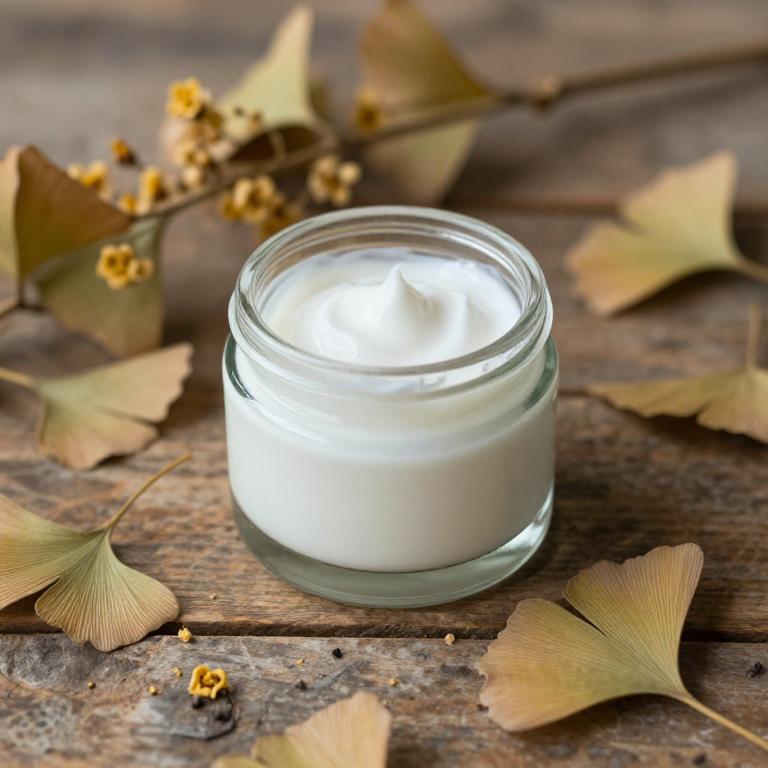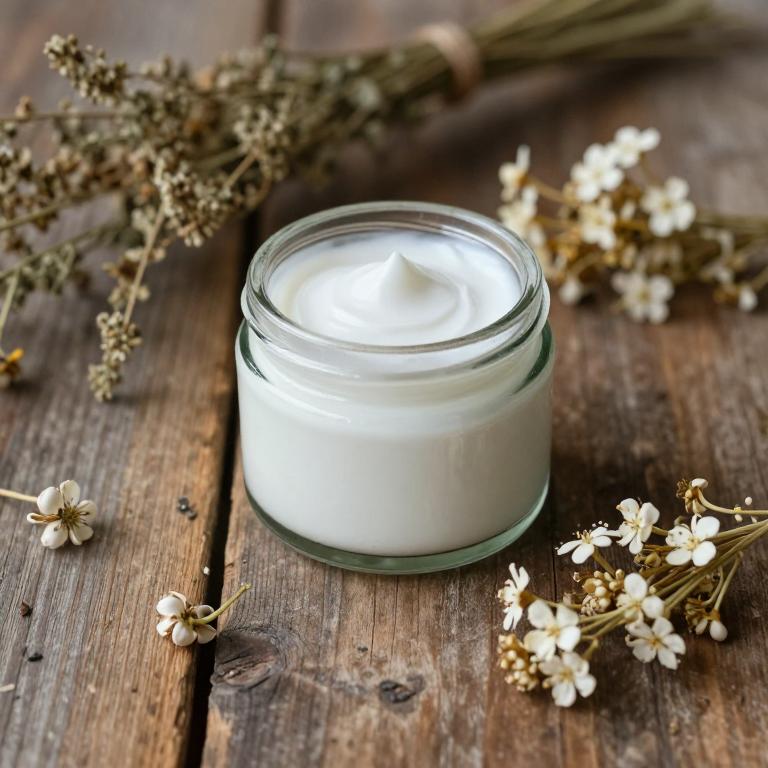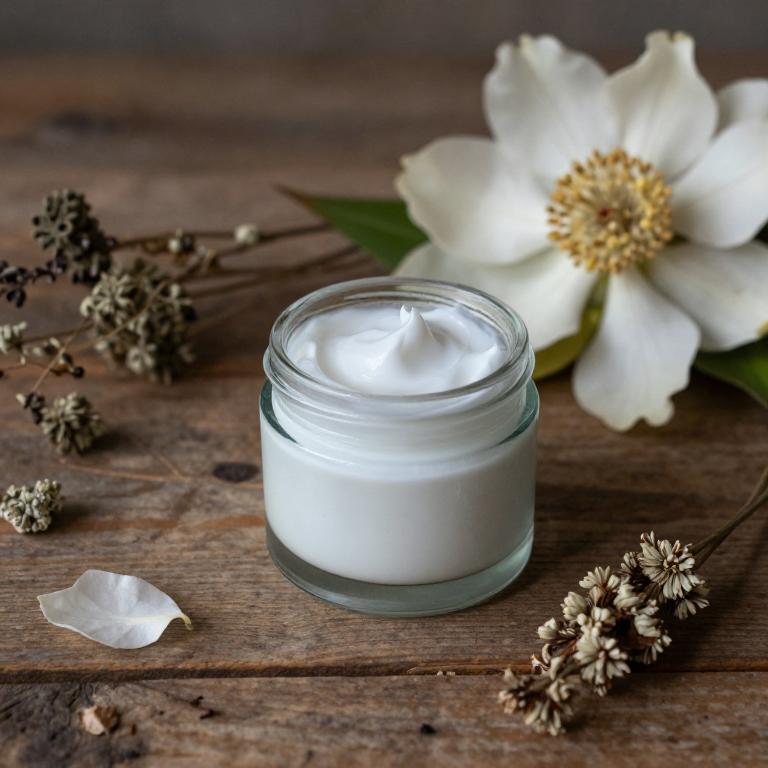10 Best Herbal Creams For Migraine

Herbal creams for migraine are topical treatments that incorporate natural ingredients such as lavender, peppermint, and eucalyptus, which are believed to have soothing and pain-relieving properties.
These creams are often used as an alternative or complementary therapy to conventional migraine medications, offering a more natural approach to symptom management. The active ingredients in herbal creams may help reduce inflammation, relax tense muscles, and improve blood circulation, which can alleviate migraine pain. While some studies suggest that certain herbs may provide relief, their effectiveness can vary, and results may depend on individual sensitivity and the specific formulation.
It is important to consult a healthcare professional before using herbal creams, especially if you are on other medications or have underlying health conditions.
Table of Contents
- 1. Chaste tree (Vitex agnus-castus)
- 2. Turmeric (Curcuma longa)
- 3. Salvia (Salvia officinalis)
- 4. Echinacea (Echinacea purpurea)
- 5. Ginger (Zingiber officinale)
- 6. Ginkgo (Ginkgo biloba)
- 7. Valerian (Valeriana officinalis)
- 8. Stinging nettle (Urtica dioica)
- 9. Yarrow (Achillea millefolium)
- 10. White water lily (Nymphaea alba)
1. Chaste tree (Vitex agnus-castus)

Vitex agnus-castus, commonly known as chaste tree, has been traditionally used in herbal medicine for its potential to support hormonal balance and alleviate symptoms of conditions like migraines.
Herbal creams containing vitex agnus-castus are often formulated with other soothing ingredients such as lavender or chamomile to enhance their calming effects. These creams are typically applied topically to the temples, neck, or shoulders to provide localized relief from tension and pain associated with migraines. While research on the efficacy of vitex agnus-castus for migraines is limited, many users report a reduction in frequency and intensity of headaches when using these natural remedies.
As with any herbal product, it is advisable to consult a healthcare provider before use, especially if you are on medication or have underlying health conditions.
2. Turmeric (Curcuma longa)

Curcuma longa, commonly known as turmeric, has been traditionally used for its anti-inflammatory and analgesic properties, making it a popular ingredient in herbal creams for migraine relief.
These creams often contain curcumin, the active compound in turmeric, which is believed to help reduce inflammation and pain associated with migraines. When applied topically, curcuma longa creams may provide localized relief by targeting the affected areas of the head or neck. However, the effectiveness of these creams can vary, and they are typically used as a complementary therapy rather than a standalone treatment for migraines.
It is advisable to consult a healthcare professional before using turmeric-based products, especially if you have sensitive skin or are taking other medications.
3. Salvia (Salvia officinalis)

Salvia officinalis, commonly known as sage, has been traditionally used in herbal medicine for its potential therapeutic properties.
Recent studies suggest that sage extracts may possess anti-inflammatory and analgesic effects, which could be beneficial in alleviating migraine symptoms. Some herbal creams containing salvia officinalis are formulated to provide localized relief by reducing inflammation and soothing pain in the affected areas. These creams are often marketed as natural alternatives to conventional migraine treatments, appealing to individuals seeking holistic approaches.
However, while preliminary research is promising, more clinical trials are needed to fully establish the efficacy and safety of salvia officinalis in migraine management.
4. Echinacea (Echinacea purpurea)

Echinacea purpurea, commonly known as purple coneflower, is a traditional herbal remedy that has been explored for its potential benefits in managing migraine symptoms.
While it is more widely recognized for its immune-boosting properties, some studies suggest that echinacea may have anti-inflammatory and analgesic effects that could help alleviate migraine pain. Herbal creams containing echinacea purpurea are often formulated with other natural ingredients to enhance their soothing and pain-relieving properties. These creams are typically applied topically to the temples, forehead, or neck to provide localized relief from headache discomfort.
However, it is important to consult with a healthcare professional before using echinacea-based products, especially for individuals with allergies or those taking other medications.
5. Ginger (Zingiber officinale)

Zingiber officinale, commonly known as ginger, has been traditionally used for its medicinal properties, and recent research suggests that ginger-based herbal creams may offer relief for migraine sufferers.
These creams typically contain ginger extract, which is believed to have anti-inflammatory and analgesic properties that can help reduce pain and inflammation associated with migraines. When applied topically, the active compounds in ginger can penetrate the skin and target the affected areas, providing localized relief without the systemic side effects of oral medications. Some studies indicate that regular use of ginger herbal creams may help prevent the frequency and severity of migraine attacks.
However, while promising, more clinical trials are needed to fully establish their efficacy and safety for long-term migraine management.
6. Ginkgo (Ginkgo biloba)

Ginkgo biloba herbal creams are topical treatments that incorporate extracts from the ginkgo tree, known for its potential to improve blood circulation and reduce inflammation.
These creams are often used as a complementary therapy for migraine relief, aiming to alleviate pain and prevent future attacks by enhancing cerebral blood flow. While some studies suggest that ginkgo biloba may help reduce the frequency and severity of migraines, more rigorous clinical trials are needed to confirm its efficacy. The application of these creams typically involves massaging the affected areas, which can provide a soothing effect and localized relief.
However, individuals should consult with a healthcare provider before using ginkgo biloba products, especially if they are on medications or have existing health conditions.
7. Valerian (Valeriana officinalis)

Valeriana officinalis, commonly known as valerian, is a traditional herbal remedy often used in the formulation of herbal creams for migraine relief.
These creams typically contain valerian root extract, which is believed to have calming and analgesic properties that may help reduce the intensity of migraine pain. When applied topically, the active compounds in valerian can penetrate the skin and interact with pain receptors, potentially offering localized relief without systemic side effects. While scientific evidence supporting its efficacy for migraines is limited, many users report a soothing effect, making it a popular alternative for those seeking natural remedies.
As with any herbal treatment, it is advisable to consult a healthcare professional before use, especially if you are taking other medications or have underlying health conditions.
8. Stinging nettle (Urtica dioica)

Urtica dioica, commonly known as stinging nettle, has been traditionally used in herbal medicine for its potential therapeutic properties.
Some herbal creams containing Urtica dioica are marketed for their anti-inflammatory and analgesic effects, which may offer relief for migraine symptoms. These creams are often applied topically to the temples, forehead, or neck to help reduce pain and inflammation associated with migraines. However, scientific evidence supporting their efficacy for migraine specifically is limited, and results may vary among individuals.
It is advisable to consult a healthcare professional before using such products, especially if you are on other medications or have underlying health conditions.
9. Yarrow (Achillea millefolium)

Achillea millefolium, commonly known as yarrow, has been traditionally used in herbal medicine for its anti-inflammatory and analgesic properties, making it a potential ingredient in herbal creams for migraine relief.
These creams often combine yarrow extract with other soothing herbs like chamomile or lavender to enhance their effectiveness in reducing headache intensity. The anti-inflammatory compounds in yarrow may help alleviate the inflammation and pain associated with migraines by targeting blood vessels in the brain. While scientific evidence supporting its use for migraines is limited, many users report a reduction in headache frequency and severity when using yarrow-based topical treatments.
As with any herbal remedy, it is advisable to consult a healthcare professional before incorporating yarrow creams into a migraine management plan.
10. White water lily (Nymphaea alba)

Nymphaea alba, commonly known as the white water lily, has been traditionally used in herbal medicine for its calming and soothing properties.
Recent studies suggest that extracts from Nymphaea alba may help alleviate migraine symptoms by reducing inflammation and promoting relaxation of blood vessels. Herbal creams infused with Nymphaea alba are gaining popularity as a natural alternative for managing migraine pain and associated tension. These creams are often combined with other calming ingredients like chamomile and lavender to enhance their therapeutic effects.
While more research is needed, preliminary evidence indicates that Nymphaea alba herbal creams may offer a gentle and effective approach to migraine relief.